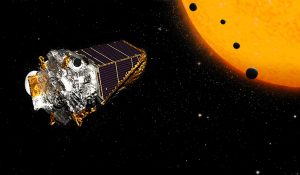
Illustration of NASA’s Kepler mission
Chris North, Sarah Roberts and Matt Smitth discuss the landing of NASA’s Insight probe, which is set to investigate the interior of Mars and search for Mars-quakes. Closer to home, we’re celebrating 20 years of the International Space Station this month. In astrophysics research, Cardiff researchers, including Matt, were involved in a study of exploding stars, and identifying where many of the Universe’s heavy elements originate.
Over the past 20 years, the number of planets known outside our own Solar System has increased hugely. Many of those discoveries were made by the Kepler mission, which launched in 2009 to try to figure out just how many planets there were out there, and whether they were anything like the Earth. After a problem with its gyroscopes meant that the mission had to change its operation mode, becoming the “K2” mission, the science outputs diversified. Dr Geert Barentsen, from NASA’s Ames Research Centre, explains what Kepler’s legacy is.
An extended edition of an original broadcast on 29th November 2018 as part of Pythagoras’ Trousers on Radio Cardiff.
Don’t forget you can now subscribe to the podcast. For an archive of Pythagorean Astronomy, visit pythagastro.uk.





